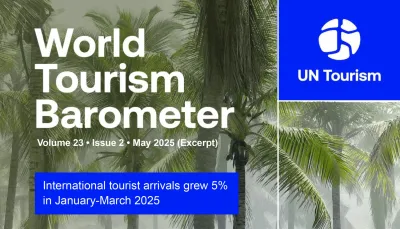EU Lawsuit on Price Parity Clauses
20-Year Legal Exposure and Potential Massive Fines
Massive Affiliate Program Cuts ("Booking-geddon")
Shift from Growth Strategy to Risk Management
Impact on Content Creators and Niche Travel Media
Ripple Effects Across the Travel Ecosystem (Hotels, Startups, Regulators, Investors)
Booking.com Under Pressure: The Travel Giant Shifts Into Defense Mod

EU Lawsuit on Price Parity Clauses
20-Year Legal Exposure and Potential Massive Fines
Massive Affiliate Program Cuts ("Booking-geddon")
Shift from Growth Strategy to Risk Management
Impact on Content Creators and Niche Travel Media
Ripple Effects Across the Travel Ecosystem (Hotels, Startups, Regulators, Investors)
Legal battles, mass affiliate cuts, and a changing playbook signal a new chapter for the OTA powerhouse
May 2025 may well go down as a pivotal month for Booking.com. In just three days, the global online travel agency found itself facing a double blow that strikes at the heart of its business model—forcing the company into a rare defensive posture.
On May 28, European hotel associations launched a mass legal action seeking compensation over a 20-year period, empowered by a landmark ruling from the EU Court of Justice that challenges the legality of Booking’s price parity clauses. Then, on May 30, the company delivered a brutal blow to its affiliate network: thousands of small partners were abruptly cut, with only those generating €1,000+ per month allowed to remain. The move sent shockwaves through the content creator and niche media communities—quickly dubbed “Booking-geddon.”
The timing wasn’t coincidental. Both decisions reflect a broader strategic pivot: under rising regulatory and financial pressure, Booking.com is shifting from growth-at-all-costs to margin protection and risk mitigation.
Hotels Strike Back: Legal Action with Teeth
At the core of the legal offensive are most-favoured nation clauses—contract terms that prevented hotels from offering lower rates on their own websites than on Booking.com. Should Dutch courts rule these clauses anti-competitive, the implications could be seismic: a wholesale renegotiation of distribution agreements, the weakening of OTA dominance, and a major boost for direct booking channels.
Lawyers suggest the damages sought could reach hundreds of millions of euros, covering commissions paid from 2004 to 2024. The HOTREC alliance and its member associations are rallying hotels to join the class action by July 31.
Booking.com's response? The company argues the ruling is limited to historical cases in Germany (2006–2016) and that the Amsterdam courts have yet to assess the broader competitive implications.
Affiliate Cuts: Trimming the Long Tail
On the commercial front, Booking has launched a dramatic “rationalization” of its affiliate program. Travel bloggers, niche comparators, and smaller media sites—once valued for their long-tail traffic—were unceremoniously dropped. Starting June 20, their links will stop earning commissions.
The timing is painful: just before peak summer season. Many creators are scrambling to replace thousands of links, risking loss of income and SEO rankings built over years.
Strategically, Booking’s move signals three clear priorities:
- Cost containment ahead of potential litigation losses
- Shifting budget to higher-volume, performance-driven channels like Google and metasearch
- Brand control, reducing the reputational risks tied to lower-quality affiliate content
How the Pieces Fit Together
These are not isolated incidents. Together, they paint a picture of a company reshaping itself under multiple forms of pressure:
| Pressure | Booking.com’s Response | Side Effects |
|---|---|---|
| Regulatory (price parity) | Financial (distribution costs) | Competitive (AI, Google, metas) |
|
Legal risk containment and potential |
Cuts to low-yield affiliates | Resource reallocation to product & paid media |
| Encourages hotels to prioritize direct sales |
Loss of long-tail traffic may increase CAC elsewhere |
Increased reliance on expensive, auction-based traffic |
|
|
What to Watch Next
- Hotel sign-ups to the lawsuit – Participation rates by July will reveal the true scale of the legal threat.
- Affiliate migration patterns – Displaced creators may flock to rival programs like Expedia TAAP or Trip.com, redistributing online influence.
- Q2/25 EBITDA margin – Any compression may hint at litigation provisioning or higher customer acquisition costs.
- Global regulatory ripple effects – Following Switzerland’s recent commission caps, more countries may follow suit.
Why This Matters for the Ecosystem
For hotels, this is both an opportunity and a risk: the chance to reclaim control through direct channels, but also the threat of diminished visibility if Booking remains key to last-minute occupancy.
For startups and niche OTAs, the shake-up opens a rare window: onboard disenfranchised creators and attract hotels looking for alternatives.
For investors, it’s a stress test of a once-bulletproof model. The question: can marketplace moats withstand regulatory fire and margin compression?
Bottom Line: The Shift from Growth Engine to Risk Manager
May revealed a critical turning point: Booking.com is no longer just a performance marketing machine—it’s now a company managing litigation, brand risk, and strategic focus under pressure.
The rules of online travel distribution are being rewritten. Booking has played its hand. Now, the rest of the ecosystem must decide how to respond.
Because in this new phase, diversification isn’t just smart. It’s survival.



